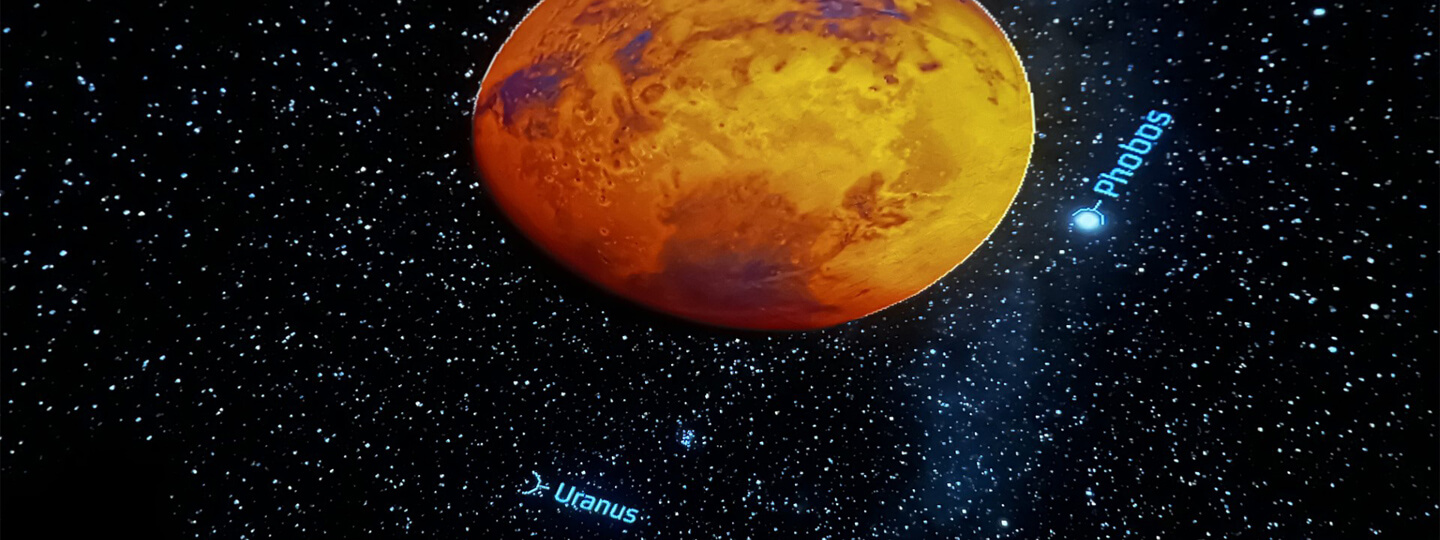
Inflatable Classrooms
Digital Planetarium
Blast off through space and time with our digital planetarium! Discover how powerful software and an HD projector makes our portable, inflatable dome more immersive for your learners than ever before. Experience the extreme weather and geological features of our Solar System’s many planets and moons, then rocket beyond the Sun to witness wonders of the universe such as nebulae and black holes. Finally, watch for familiar celestial bodies as we shift from day to night-time sky, highlighting objects your students can see from their own backyards!
Capacity: 30 students
Time required: 60 minutes for set up and 60 minutes for clean up
Fee: $290 includes set-up and two presentations (shows can be different); $145 for each additional presentation.
Requirements: 13’ ceiling height, 20’ x 20’ floor space, and electrical access to 120 V. outlet.
Available Programs
One World: One Sky: Big Bird’s Adventure
Pre-Kindergarten–2nd grade
Back by popular demand!
Based on the popular children’s show Sesame Street®, this cross-cultural planetarium show provides an introduction to astronomy as Elmo and his friend, Hu Hu Zhu, from the Chinese production of Sesame Street, go on an exciting adventure to discover the Sun, Moon, and stars. This show is geared especially for the littlest astronauts.
Moving Right Along
Kindergarten–2nd grade
Moving Right Along is an introduction to Earth’s rotation and revolution and how those movements affect our view of the sky.
What’s Up
Kindergarten–2nd grade
What’s Up explores what we can see in the sky (stars, planets, the Moon) and differences between those objects.
Planets
Grades 2–6
Planets explores the differences between stars and planets, how we can recognize a planet in the night sky, and planetary motion.
Moons of the Solar System
Grades 3–6
Moons of the Solar System explores differences between planets and moons, and introduces students to major moons of the solar system.
Solstice and Equinox
Grades 6–8
Solstice and Equinox explores the relevance of solstices and equinoxes, including how they relate to the seasons we experience.
World in Motion
Grades 6–8
World in Motion explores what is in motion in our solar system. The Earth’s movements give us the day and the year. Gravity keeps planets in orbit around the Sun and the Moon in orbit around the Earth. Learn how to recognize a planet in the night sky, and prograde and retrograde planetary motion.
Hubble Space Telescope
Grades 9–12
Hubble Space Telescope explores why the Hubble Space Telescope is in space, as well as some of the discoveries it has made.
The Sun
Grades 7–12
The Sun explores the age, energy sources, and structure of our closest star. This lesson discusses the sun’s role in supporting life on Earth. Students are also introduced to different types of solar eclipses.
Jupiter and the Galilean Moons
Grades 7–12
Jupiter and the Galilean Moons explores Galileo’s contribution to modern astronomical knowledge. Students learn about some past, current and future missions to Jupiter or its moons.
Register your group for a Portable Planetarium experience today by calling 412.237.3400.
Our Reservations Team is available Monday through Friday, 9 am 5pm.


